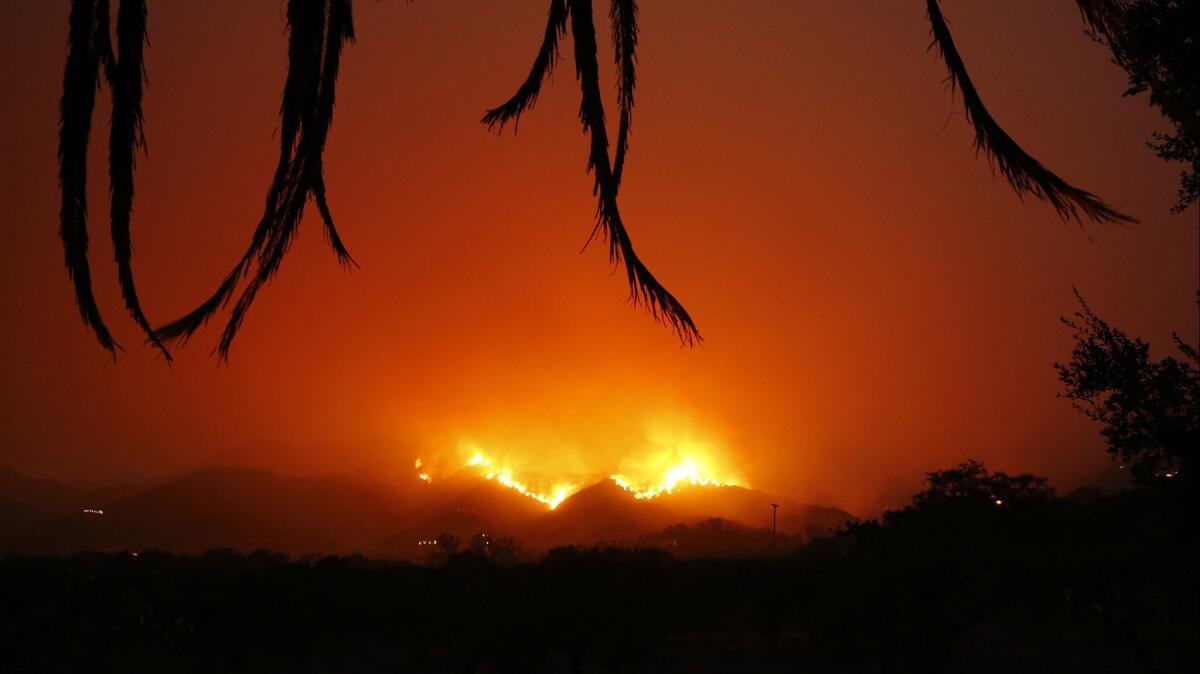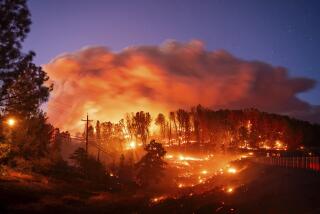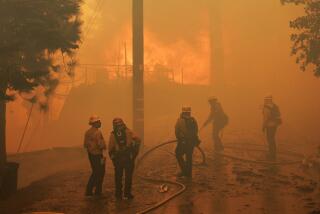Southern California Edison says its equipment helped spark massive Thomas fire that killed 2

Southern California Edison on Tuesday said its electrical equipment likely sparked at least one starting point in the massive Thomas fire that ravaged Ventura and Santa Barbara counties late last year.
The utility said in a statement that witnesses reported a fire igniting along Koenigstein Road in Santa Paula near a power pole and that the company “believes that its equipment was associated with this ignition.”
The announcement comes as Edison faces multiple lawsuits in connection with the Thomas fire, marking another devastating blaze attributed to a utility company’s equipment in recent years.
Capt. Stan Ziegler of the Ventura County Fire Department, which is spearheading an investigation by multiple public agencies, said the Thomas fire had at least two starting points: Koenigstein Road and Anlauf Canyon in Ventura County.
An official cause of the blaze has not yet been declared, and the utility’s statement is based solely on the company’s own investigation, Ziegler said.
“We’re not coordinating information,” he said. Fire authorities hope to release the official cause by the end of November, Ziegler said.
The Thomas fire began Dec. 4 and charred 281,893 acres to rank as the second-largest ever recorded in California history, behind the Mendocino Complex inferno that burned in Northern California this summer, according to the California Department of Forestry and Fire Protection.
Two deaths were attributed to the blaze: Virginia Pesola, 70, of Santa Paula, was found dead in a car that crashed along an evacuation route in Ventura County, and San Diego fire engineer Cory Iverson, 32, was killed battling the fire on Dec. 14. The fire destroyed 1,063 structures.
Steven Conroy, an Edison spokesman, told The Times that when it was determined that the utility’s equipment likely contributed to the ignition, “we felt it was important for our customers and our communities to hear from us.”
In a filing with the Securities and Exchange Commission, the company said it was expecting to incur losses from lawsuits filed in connection with the blaze but said it was unclear how much.
In a phone call with investors on Tuesday, Pedro Pizarro, president and chief executive of Edison International, said the utility “is continuing to assess the progression of the fire from the Koenigstein Road ignition point and the extent of property and other damage that may be attributable to that ignition.”
He said the company had not determined whether the ignition in the Anlauf Canyon area involved the utility’s equipment. At both locations, Cal Fire has removed Edison equipment, Pizarro said.
“We have not been granted access, which has delayed the completion of our review,” Pizarro said. “Given the uncertainty as to the contributing causes of the Thomas fire, the complexities associated with multiple ignition points and the potential for separate damages to be attributable to fires ignited at separate ignition points, we are currently unable to reasonably estimate a range of losses that may be incurred.”
Joseph Liebman, a Santa Barbara attorney who represents victims of the Thomas fire who have sued Edison, said the company’s statement is “a very significant development and one that will be admissible in court to prove Edison’s liability in causing the Thomas fire.”
Liebman said his law firm and two others represent nearly 500 victims of the fire and the subsequent mudflow on Jan. 9 that devastated Montecito and killed 21 people. The attorney said the fire, which left steep mountains and slopes above Montecito bare of vegetation and unable to absorb heavy rainfall, created the conditions responsible for the mud and debris flow.
The cases, he said, related to property damage, personal injury and wrongful death, and that damages could exceed $1 billion. Liebman said the plaintiffs’ attorneys are confident that the fire’s second starting point also is related to Edison equipment.
“Our clients, when they learn of this, will be very, very pleased,” he said.
Many of California’s most destructive fires have been fueled by powerful winds, which in some cases have caused power lines to snap off and spark blazes. Utility companies are on the hook for hundreds of millions of dollars in losses. Two of the state’s largest electricity providers — Pacific Gas & Electric and San Diego Gas & Electric — both face steep costs related to past wildfires.
In a sweeping effort to reduce the wildfire risk from electric power lines, Edison said in September that it wants to spend $582 million for a series of improvements to its grid that likely would mean higher bills for ratepayers.
Edison is asking the state for permission to spend the money on improvements, including strengthening poles and using better technology to determine when winds put the power grid at risk.
Over the next two years, an estimated 600 miles of exposed power lines would be replaced with insulated ones. Officials said ratepayers would see their bills increase between 81 cents and $1.20 a month.
Twitter: @haileybranson
UPDATES:
8:30 p.m.: This article was updated with comments from Edison officials and an attorney representing victims of the Thomas fire as well as background about wildfire losses.
This article was originally published at 4:25 p.m.
More to Read
Sign up for Essential California
The most important California stories and recommendations in your inbox every morning.
You may occasionally receive promotional content from the Los Angeles Times.











